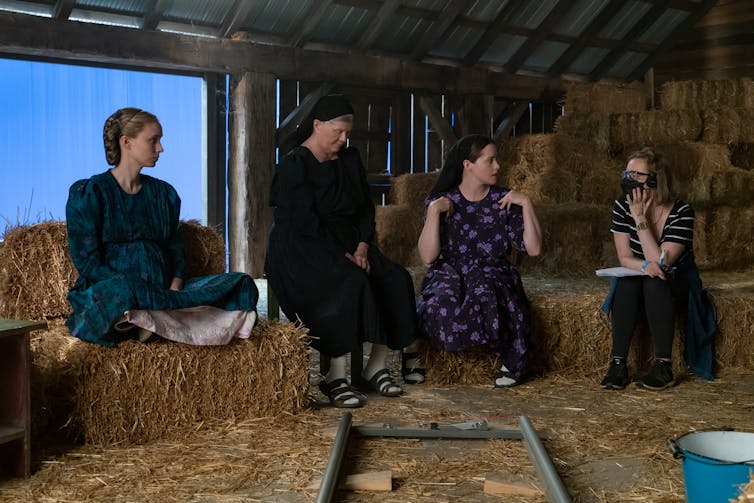Words matter. They give expression to our experiences, allow us to tell our stories and make sense of our place within the world. With language comes the ability to speak: to speak for, and to speak out. To name injustices and imagine alternative futures. The radical feminist Audre Lorde tells us that our silence will not protect us, that we must turn our silence into words, and those words into action.
The director Sarah Polley’s Women Talking follows a group of women as they find the language to talk about their experiences of violence and collectively imagine a future that might bring an end to the harms they have endured at the hands of men. Based on Miriam Toews 2018 novel of the same name, both the film and the book are an imagined response to a series of real-life sexual attacks on a group of women in a Mennonite community in Bolivia.
The film is set almost exclusively in a barn in which the women of the colony hold a secret meeting to determine whether to stay or leave following the attacks. Crucially, the women are unable to take the minutes of their meeting, as they can’t read and write, reminding viewers of language’s power to exclude; that language is man-made and so serves those who created it.
Cinema, like the written word, has long been the province of men. Since the days of the studio system (around 1917-1960) women have been systematically excluded from significant creative roles and continue to remain a minority when it comes to directing and producing. Women Talking is therefore a remarkable film in that it is both written, directed and produced by women.
Rewriting the rules
As is so often the case in filmmaking, the gruelling shooting schedule, often on location miles from home, prevents many – typically female – caregivers from assuming the role of director.
A mother of three young children, Polley expected only to write the film and hand the project over. However, producers Frances McDormand and Dede Gardner were keen to have Polley at the helm. To facilitate this, a radical shift in established creative practices was required.
Together, McDormand, Gardner and Polley rewrote the masculine rules of filmmaking.
A feminist ethics of care was placed at the centre of their process. Polley ensured that they kept to ten-hour working days to allow cast and crew appropriate rest times. This also ensured that those with caring responsibilities could take breaks whenever needed. They also hired a therapist who remained on set throughout filming. The result, according to cast and crew was a nurturing and safe set.
Polley extends the same level of care to her audience. The film does not linger on the brutality of the attacks. Instead, the focus is on the myriad responses to such an ordeal – and completely without judgement.
Polley reportedly made the conscious decision to make the film “placeless”. She refuses to orient her audience by naming a location in which these attacks take place – though crucially we are given a time, 2010. The aim was to force all contemporary patriarchal societies and systems to recognise their complicity in violence again women and girls, rather than dismiss the horrific attacks as the product of a specific national, cultural or religious context.

The #metoo movement made clear that gender-based violence holds no boundaries and exposed the film industry itself as a hotbed of abuse. In a recent interview with Meghan Daum, Polley reflects on the movement, which she believes has “stalled”. She says that while it illuminated the scale of the problem, it is important not to “get stuck” in the “helplessness and rage” but imagine “what a future might look like”.
Women Talking is an exploration of the possibilities and difficulties of imagining a future free from violence, both on and off screen. It captures the messiness of collective action and the beauty of solidarity in such a way that leaves the audience hopeful for what might be possible, while under no illusion of the struggle and sacrifice it will take to achieve it.
Helen Warner does not work for, consult, own shares in or receive funding from any company or organization that would benefit from this article, and has disclosed no relevant affiliations beyond their academic appointment.
This article was originally published on The Conversation. Read the original article.







